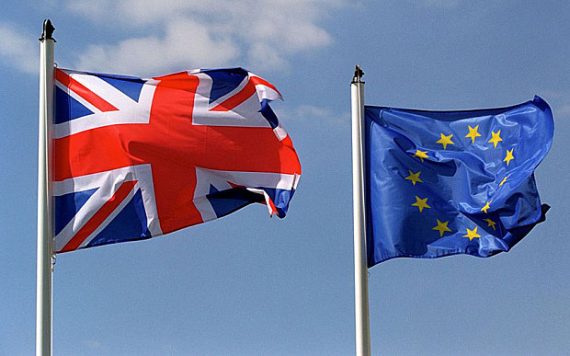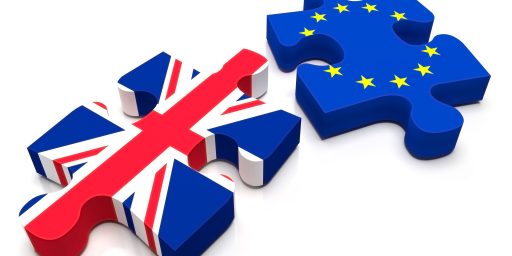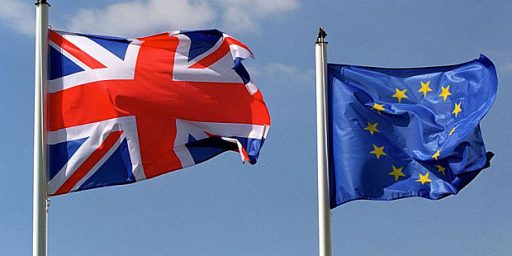United Kingdom Sets ‘Brexit’ Referendum Vote For June 23rd
Britons will go to the polls in June to decide the future of their country's relationship with the rest of Europe.
The United Kingdom will vote on June 23rd on whether to stay in the European Union, or to get out:
LONDON — Britons will vote on June 23 on whether to stay in the European Union or to quit, Prime Minister David Cameron said on Saturday, announcing the date of a referendum that could have momentous consequences for a divided Britain, and for the rest of Europe.
Mr. Cameron made the announcement after presiding over a meeting of his cabinet — which is itself split over Europe — and hours after securing a hard-fought deal, which he said gave Britain “special status” in the 28-nation bloc.
“We are approaching one of the biggest decisions this country will face in our lifetimes,” Mr. Cameron said outside his office on Downing Street, adding that he would recommend a vote to stay. “Leaving Europe would threaten our economic and national security,” he added.
Highlighting the historic nature of the decision facing Britain, the cabinet met for the first time on a Saturday in more than three decades, and talked for more than two hours.
The stakes are high for Britain, for the European Union and for Mr. Cameron personally. A vote by Britain to leave would further damage a European Union already battling to control an economic crisis in its single currency zone, and a wave of immigration, prompted partly by the civil war in Syria.
For Britain, a withdrawal would have major implications, too, because it could lose automatic access to Europe’s single market, provoke economic uncertainty and leave the country more isolated internationally. Demands for a new referendum on Scottish independence could be triggered if the English vote differently from the more pro-European Scots.
On Saturday, Mr. Cameron lost no time in highlighting economic and other risks of a British withdrawal, which he called a “leap in the dark.”
Yet the referendum remains a gamble for Mr. Cameron, who has often sounded critical of the European Union in the past, but has now shifted to support a bloc that he admits he does not love. His tone became noticeably more pro-European after an agreement struck in Brussels on Friday giving concessions to Britain on a range of economic, sovereignty and welfare issues. His most senior allies, including, significantly, Theresa May, the home secretary, will support Mr. Cameron’s bid to stay inside the bloc.
Yet six cabinet ministers made it clear on Saturday that they will campaign for a British exit — known as Brexit.
The most significant of those is Michael Gove, the justice secretary and a personal friend of Mr. Cameron’s, whose decision personifies the fissures at the top of the Conservative Party.
But uncertainty surrounds the position of Boris Johnson, the mayor of London, whose support would be seen as a big asset by the “no” campaign because he is renowned as a communicator.
Mr. Johnson, long a Euroskeptic, has not yet made his views on withdrawal from the union clear, and his position is thought by many to be significant because the outcome of the referendum is hard to predict.
Meanwhile the two main groups campaigning for a British departure lack a convincing leader and are divided on tactics. One favors the argument that the European Union lacks democratic accountability, and that it stifles economic growth. A second group places more emphasis on immigration, and says that Britain can only fully regain control of this policy if it quits the bloc.
Supporters of European Union membership hope that Mr. Cameron’s status as an election-winning prime minister will prove decisive in the referendum campaign, which will be the first British plebiscite on Europe since 1975. Then, Britons voted by a clear margin to stay in what was called the European Economic Community, which they had joined in 1973.
Under pressure for the right of his own party, Mr. Cameron promised the referendum in 2013, but said he would renegotiate British ties to the bloc first. That effort culminated in an agreement in Brussels late Friday after more than 30 hours of talks.
Mr. Cameron argued that the deal was good enough to give Britain “the best of both worlds,” allowing the country to have the benefits of European Union membership while staying out of its single currency and passport-free travel zone. Nigel Farage, leader of the U.K. Independence Party, which wants to quit the bloc, dismissed Mr. Cameron’s agreement as “pathetic.”
The announcement of the referendum date, which was something that Cameron’s Conservative Party had promised would take place if it was returned to power in last year’s elections, came after Cameron had negotiated concessions from European officials designed to address the objections of many of those Britons skeptical of the European Union and its impact on their nation. Among the concessions that Cameron came home with was an agreement that Britain would be an exemption from the obligation to pursue “ever closer union,” which it seems many skeptics saw as a road to further eradication of British sovereignty even though this is a largely symbolic part of the main European Union treaty. The agreement also gives the United Kingdom the right to restrict welfare entitlements for citizens from other parts of the E.U. for a period of up to four years. Other part of the agreement included restrictions on child benefits and protections for Britain’s lucrative financial sector as well as continued protection from retaliation for the nation’s decision not to adopt the Euro in favor of maintaining the Pound. The agreement also include changes to how new European Union laws are adopted, but as Kevin Drum notes the actual nature of the changes seems to be more window dressing than substance and seems far from the “National Veto” that the changes are being sold as. In any case, the important question is whether these changes will be sufficient to address the concerns of the hardcore Euroskeptics, and the answer to that question seems clearly to be that it most likely that it won’t. For many of these people, the objections to the E.U. are as much about nationalism as they are about philosophy and, to the extent that’s the case some minor changes in legislative procedure in Brussels probably aren’t going to be enough to satisfy the objections of people who have have railing about the E.U. for decades now.
As I noted when I last wrote about this issue back in November, there were signs starting late last year that support for leaving the E.U. was gaining among British voters. As I suggested at the time, it was likely the case that issues such as the Eurozone crisis, the Syrian refugees coming into Europe, and terrorism were causing numbers that had been slightly pro-E.U. beforehand to shift in favor of the Europskeptics. Looking at the poll tracker at The Telegraph, it would appear that the polls have continued to fluctuate but that we’re still at the point where a majority of Britons would vote to remain in the European Union if the vote were held today. Now that a referendum date has been set, the campaign by both sides is likely to kick into high gear, however, and that’s when these numbers will actually start to mean something. In many respects, then, this vote will likely be much like the Scottish Independence referendum of several years ago, with the result in the end depending on which direction the British people want to take their country and on what happens between now and then that could influence their opinion about the risks and benefits of continued membership in the European Union.
Quite obviously, the outcome of this referendum is likely to have a significant impact going forward regardless of which way it goes. Defeat for the Euroskeptics will likely secure some of the shaky politics of the European Union itself and would, at least for the foreseeable future, quiet the Euroskeptics not only in the U.K. but also elsewhere in Europe. If the option to leave the E.U. succeeds, though, it could have a significant impact on European politics as a whole, and to the entire European Union idea, in that it would likely inspire Euroskeptics elsewhere in Europe to make the same attempts in their own country. At that point, the future of the whole European experiment could be in doubt.




Because of the terrorism threat the EU’s open borders policy will soon end anyway. The EU has become a worthless massive bureaucracy. The Euro was always a bad idea and simply an attempt by Germany to accomplish their hegemony which they failed to do by war.
If the English vote to leave the EU because they don’t want to be undemocratically ruled from Brussels, they give away their best arguments against those Scots who don’t want to be undemocratically ruled from London. This will be the defining vote for the future of the UK, deciding whether in fact it has any future at all.
I’ll never understand that nonsense. No-one in Germany wanted the Euro. It was essentially the “price” of further integration.
The great proponents of the Euro were the French. that thought that a common currency would weaken the reunified Germany.
I’m in favour of the EU. But it’s like a clingy date, that always wants to be even closer to you and jumping on every opportunity to do so, giving you the feeling you have no space to breathe. It makes people want to leave.
Best thing for the EU would be more reluctance in pursuing integration, and being smart about which steps to take to preserve stability.